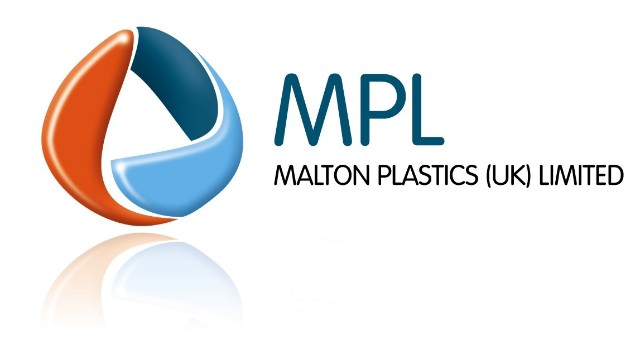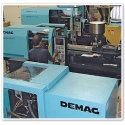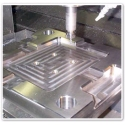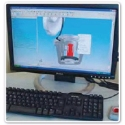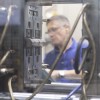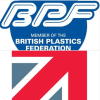Malton Plastics (UK) Ltd
Here at Malton Plastics Ltd, founded in 2001 we first operated from the market town of Malton. Now in our premises in the nearby town of Pickering Malton Plastics Ltd we specialise in producing plastic injection moulding for a variety of markets. Currently we provide to the automotive; agricultural; electronics; commercial floorcare; domestic appliances and gardening to name a few
-
THE IMPORTANCE OF THE NIGHT SHIFT FOR INJECTION MOULDERS
6 November 2019The night shift, dreaded by some, loved by others. Nearly all injection moulders at some point will have embraced the night shift as orders come in thick and fast. Here at MPL we always look to accommodate customer orders when and where we can. Typically, we can forecast orders and stock appropriately to meet customer demand. However, a surge in orders and enquiries over the summer has forced us into running late shifts. And after another surge we have decided to run night shifts.
Positives
So what are the positives to the night shift? Firstly, you’re manufacturing output is almost three times greater than the average work day. With most people working on average around 38 to 37 hours a week (ONS, 2018).
Furthermore at MPL night shift workers receive more pay and work less shifts, 4 nights rather than 5 days. This means individuals have more time over the weekend to do what they want to do.
Negatives
However, a study from the University of Surrey found that the night shift can have severe implications on an individuals ability to perform effectively and also their health:
⦁ Increased accidents
⦁ Errors (36% higher incidence of seriously improper medical decisions were made by interns working a traditional shift compared to a intervention that excluded extended shifts)
⦁ Obesity
⦁ Metabolic syndrome (decreased HDL cholesterol, elevated triglycerides)
⦁ Glucose intolerance/diabetesThe study also found that on the contrary to what most people think, that night shift workers do not adapt their Circadian Rhythm to their work day. The Circadian Rhythm is the bodies natural rhythm and it unfluences a person’s ability to sleep. (Arendt cited in Villnave, 2012).
Other studies also note the negative effects the night shift can have both on an individuals performance and health. Sometimes though with urgent orders, shift work can be almost unavoidable, and what we and other companies do and should look to do is reduce the negative effects as much as possible. For example, shift work isn’t something we do on a regular basis and we avoid it when we can. But when we need to do it, employees are given extended breaks, paid more and work 4 nights rather than 5 days. Furthermore, the work we tend to run over night is either simple or autonomous, reducing the risk of error.
Summary
From a personal note having worked the night shift myself, it is much preferable to be working overnight when it is cold, rather than the hot summers day we are currently experiencing. Also, only working 4 nights gave myself and others a longer weekend, which to me balances out the social aspect of the job as you may miss evenings mid week but you gain an extra day to your weekend to go out with friends and family. The perceived positives of the night shift have more of a benefit to the company and/or organisation. This is because it is beneficial to meet customer demands on time, retaining and improving the B2B relationship. The negatives of the night shift revolve around the individual worker and the negative effects that working overnight have on performance and health. Ultimately, as a company we need to find a balance between our customer relationships and employee health and satisfaction. This is because companies need healthy and satisfied employees to complete tasks effectively to meet customer demands and maintain relationships.
-
FIND A PLASTIC INJECTION MOULDER FOR YOUR CUSTOM PLASTIC PARTS
6 November 2019Companies today require bespoke plastic parts for a variety of reasons. For example car manufacturers require bespoke parts for the different range of cars they manufacture. Meanwhile, competitive brands look to gain a competitive advantage by providing a better looking and more functional product. These are just two examples of the types of customers plastic injection moulders will come across and work with. In reality the ability the provide bespoke plastic parts and the reasoning behind is much more complex.
Essentially, the customer has an idea or a requirement that needs fulfilling and plastic injection moulding can provide the answer. Here you will find some of things we recommend to consider when looking for a plastic injection moulder.
TECHNICAL REQUIREMENTS TO CONSIDER
Due to the technical nature of plastic injection moulding, there may only be few manufacturers within your area. It may be worthwhile considering manufacturers who are further a field from where you operate. Yorkshire and the Midlands are good places to start when looking for an injection moulder and there are plenty there. Furthermore, you have to consider finding a reputable moulder with the capacity and technical capability to meet your requirements.
Plastic injection moulders typically specialise for a certain requirement desired by customers, which can include:
- The size of the plastic part
- The volume of plastic parts
- The type of plastic required for the part
You may also find the ability of the moulder is not limited by the above requirements. Many trade moulders tend to be flexible with their approach to manufacturing and look to work with customers to provide solutions.
It is also worth considering additional requirements for your product. For example, if the part is being manufactured to go straight to market, the manufacturer might be able to label and pack the product appropriately, negating the need for you to outsource or do it yourself.
INJECTION MOULDING CAPACITY
Capacity is another issue for injection moulders, whether this be their stores or their moulding machines. Most moulders will plan to meet production needs, meaning when a customer places an order, stock is readily available. However, irregular and/or short runs can pose a production problem to a moulder. This is because moulders may book out their relevant machines for the production of their other customers mouldings. OEM’s, particularly those within the automotive industry are notorious for requiring product as and when they need it (lean manufacturing). The problem this can pose on smaller injection moulders is that irregular production can throw scheduling out of balance, and the moulder may not be able to meet the needs of the customer. Because of this problem, you will find certain moulders will specialise with the ability to provide to automotive customers, whereas other injection moulders will avoid automotive work altogether.
If you have a plastic part or an idea, then it is worth starting out by enquiring to plastic manufacturers in your local area and listening to their recommendations of what you should do and where you should go. Ultimately, the decision is down to you and although we can’t speak for everyone, we believe the vast majority of plastic manufacturers and plastic injection moulders will look to meet your needs or send you in the right direction.
-
INVESTMENT INTO NEW 350 TONNE INJECTION MOULDING MACHINE
6 November 2019Malton Plastics (UK) Limited (MPL) have recently taken delivery of a new 350 tonne injection moulding machine from Sumitomo Demag. In addition, a robot and conveyor system from Geiger Handling was also purchased to increase MPL’s manufacturing capability and capacity.
Throughout the course of the year an increase in demand for plastic mouldings required MPL to increase production capacity. This has seen MPL invest in a 350 tonne injection moulding machine from Demag. This is the largest injection moulding machine MPL have, replacing the older 320 tonne machine that was in it’s place. The slightly larger, 350 tonne Demag will increase moulding capabilities at MPL as the modern machinery is more efficient in production and with a larger mould height it can produce plastic mouldings from larger mould tools.
The robot and conveyor system from Geiger Handling will work alongside the new Demag. The benefit of this is that operating hours for the new machine can be increased by removing reliance on operator occupancy as the machine will be able to run fully automatic with parts being removed and stacked via the robot. Managing Director, Graeme Smith said “with an increase in demand for some of the larger components we produce and with new customers working with us, the new machine and conveyor will allow us to be more efficient and increase utilisation.” Graeme also added, “with the ability to produce more efficiently and run the machine for longer, we can also meet our customers demand for product”.
-
WE’RE EXPANDING!
6 November 2019Recently, Malton Plastics has acquired additional premises of approximately 5,000 sq. ft. The additional warehouse facility was taken on to deal with additional demand from current and prospective customers. In addition, the new warehouse will allow Malton Plastics to expand current manufacturing capabilities cater for even more work.
The new warehouse offers both additional storage, pick and pack facilities. Furthermore, it has allowed us to improve our current stock position and stock control, making us even more efficient than before. Malton Plastics also has the ability for increased machine capacity which would relieve the workload on current machines and create additional capacity for more work.
This move was made with some trepidation due to the circumstances surrounding Brexit. However, we believe if you stay still long enough, you’ll end up going backwards. Ultimately, our commitment to quality component manufacturing and excellent customer service helps us form long term relationships with our customers and suppliers, helping each other to overcome political and economical obstacles in whatever form they may be.
-
Malton Plastics (UK) Ltd Putting Into Production a Suite of Six Mould Tools
6 November 2019Currently underway putting into production a suite of six mould tools relocated to us by a current customer.
Five of the six tools are to produce components made from Polyphenylene Sulphide (PPS). Customer requirement, 40% glass filled.
PPS is a high-temperature semi-crystalline polymer with high thermal stability, chemical resistance, stiffness and strength.
The heat resistance of PPS combined with good electrical insulation properties means PPS has been used with electrical components in place of metals and some thermosets. As such you would notice upon tapping or dropping of a PPS moulding, it sounds metallic.
If you have a plastic moulding requirement you are looking to relocate, please feel free to contact us via phone, email or one of our socials.
-
The Positive Impact of Plastics
24 January 2018With media and public attention being firmly fixed on the negative impact that plastics are having on the environment. We wanted to remind everyone of the positive impact plastic has had. This is not to say plastic pollution isn't a real issue, but we feel people need a reminder that the world would not be as it is without plastic.
Plastic is an extremely versatile material with a huge range of applications in our day-to-day lives, taking multiple forms, textures and strengths. From bottles, containers, medical syringes, plugs, pens and clips, their use is endless.
Polystyrene (EPS) is widely recognised as an excellent source of insulation, requring 20% less thickness to achieve the same performance as spun glass wool or fibre insulation. It is also extremely inert, meaning it will react minimally in response to heat or cold. Furthermore, despite its large appearance, Polystyrene is 100% recyclable.
HDPE, ABS and Polypropylene have transformed the automotive industry. Combined with other materials, plastics can decrease the weight of many parts of cars by up to 70 %. Plastic makes vehicles more efficient as a lighter car can travel further on less fuel.
Further benefits of plastics are noted as being light, easily shaped, strong, and inexpensive. It is also inhibits contamination making it useful in sterile medical environments such as hospitals. Such as why syringes and other medical apparatus are plastic.
Plastics are providing innovative methods and tools to deal with environmental issues and while we must work together to combat the negative impact plastic can have on our environment, we must also continue to work together to create new, innovative ideas and processes of how plastic can help us all, as we have done in the recent past.
Sources:
https://www.thegreenage.co.uk/expanded-polystyrene-environment/
http://www.aimplas.net/blog/why-hdpe-has-changed-automotive-industry
https://www.alive.com/lifestyle/plastic-pros-and-cons/
-
Investment into Tooling for New Garden Products
8 November 2017Over the last few months MPL have made the decision to invest into new tooling for our gardening division, MPL Gardening. The investment will see us increase the range of propagators we currently manufacture as well as bringing new products to the EarlyGrow brand.
This is something we regularly do as we continually grow and expand our gardening product range. So much so, you'll now find the EarlyGrow brand around the world as we export into Europe and across the Atlantic. This is something we are immensely proud of, seeing our own in-house designed and manufactured product being used outside the UK as well as in.
We believe this recent investment will lead to some of our best and most innovative products yet and we can't wait to share them with you
The intended launch for our new products will be December. Check here or www.mplgardening.com for updates.
-
Malton Plastics (UK) LTD. become members of both the British Plastics Federation and Made in Great Britain Campaign.
7 September 2017Recently Malton Plastics (UK) LTD. became members of both the British Plastics Federation and Made in Great Britain Campaign.
Essentially we feel that by becoming members of these organisations we are able to champion and represent British plastics more credibly. As an ISO9001 accredited company we believe firmly in the quality of British manufacturing and now you can feel more sure than ever that what we preach is credible information. Why would we promote something if we didn't firmly believe in it?
As recent statistics are showing, British manufacturing in general is paving the way for the British economy through the turbulent Brexit negotiations. We've seen an increase demand for more workers to cope with the demand for work we are currently seeing. In addition, there have been recent reports of record high exports.
We want Britain to become renown around the world for quality products and for British Plastics to be an example of how great we really can be.
http://www.madeingb.org/
http://www.bpf.co.uk/ -
The Internet of Things and Digital Manufacturing
9 August 2017The internet of Things (IOT) is a relatively new concept and one which most could be forgiven for knowing very little about. Essentially all the IOT is about is connecting electronic devices together through the internet, meaning anything which uses the internet could and should be connected. The main goal of the IOT is to make our everyday processes smarter and more efficient. By being able to anaylse real time data we can act on it sooner and see what strategy or technique has the most effect on our processes.
Arguably, we all do this already, and as injection moulders our machines have alarms set to trigger when a fault occurs whereby the operator or technician will check the real-time data provided on the console to identify and rectify the fault. This is also what happens in regards to quantity produced as the amount is noted on the console for the operator to see while manufacturing is taking place. Following this, the machines ability to count stock could be intergrated with the warehouse stores, meaning stores are automatically updated before the delivery and no human input would be needed in regards to noting quantity and then inputting it into the stores database.
Another talking point at the minute is digital manufacturing and the 4th Industrial Revolution or 'Industry 4.0'. We're already seeing this taking effect through recent innovations such as rapid prototyping through additive manufacturing (3D Printing), as well as laser cutting and CNC machining. The IOT as previously mentioned is all a part of this '4th industrial revolution.' whereby technology as a whole will change the way manufacturers work.
An example of digital manufacturing would be the increased use of automation which is becoming more prevelant in manufacturing. Injection moulders require automation to remove components from machines and in some cases even pack boxes. However, the automation doesn't stop there as even the moulding machines themselves are essentially automated. Most jobs nowadays require human oversight, rather than human intervention and continuous involvement.
Digital manufacturing allows us to produce faster while reducing costs, which obviously sounds great. This is simply because machine processes can be standardised and repeated without fail as they aren't subject to mood, hunger or boredom, which humans are all suseptible to. Which brings us back to the IOT, here operators can observe the real-time data from the manufacturing processes. If the machines cycle time is to slow, this will be apparent and can be rectified; if there is an issue with the finish of the component the error will be easily identified and also rectified. The next step in this innovative process would be for the software to recognise and fix the fault itself via Artificial intelligence, something which is being discussed more and more in terms of achievements being made technologically but also the ethical concerns and potential dangers. For more information, watch Terminator.
One of the major concerns expressed by the public and business is what is digital manufacturing and what is the IOT? How do we use them? To answer this, it would appear that over time these systems are simply becoming more and more intergrated within homes and business. As standards improve and society moves along it becomes second nature to adapt and in extreme cases those who stay stuck in their old ways are the ones who do fall behind. Our message to the majority would be to not worry about adapting as you simply will learn to over time. For businesses and specifically manufacturers we recommend a continuous investment year on year on autonomous machinery, people and software.
To conclude, the IOT and digital manufacturing are two concepts becoming more prevelant and more useful in todays society. As business grows it makes sense to make things more efficient and in doing so making processes cheaper, and easier. Everyone should care about the 'Industry 4.0' as it will effect us all in manufacturing. With consumer demand at the highest point its ever been, the necessity and constant want requires things to happen immediately, meaning no time can be wasted. Technology allows us to do things quicker and better, but it also allows us to make predictions about the future and forecast events that are yet to happen.
-
Brexit and the Plastics Industry
25 July 2017It’s been over a year since approximately 46.5 million UK voters turned out to vote on whether the UK should leave the European Union. The result shocked the nation, as the Brexit campaign won with a slight majority of 52% of the vote, a result the brexiters themselves probably weren’t even expecting. However, since the 23rd of June, 2016 the UK has been crippled by instability both economically and politically, all surrounding our potential departure of the European Union.
Immediate effects of the Brexit vote were apparent as the Pound fell against both the Euro and the Dollar, and the FTSE 100 dropped when it had previously been climbing at a consistent rate for some time. To add to the chaos, large firms located in London threatened to move out of the UK should Brexit become a reality. The chaos was capped off by David Cameron resigning almost immediately, and so the country seemed to be on the brink of collapse with no leader and no ideas. Unfortunately, this uncertainty has carried on throughout the year and was most certainly not helped by the election held last month, June 2017 which saw Labour revitalised under Jeremy Corbyn, while the Conservatives and Theresa May lost their majority at parliament.
From the above you’d think the country would have collapsed and we’d all be broke, however, we’re still here and on the contrary British Plastics is seemingly doing rather well. The British Plastics Federation (BPF) released their conditions survey for June and July this year, and found indications of optimism within the industry. The survey results showed that 80% of respondents were predicting an increase in sales turnover within the next 12 months. In addition there also seems to be a large amount of investment going into plastics, in regards to new factories and machinery, but why such optimism when leaving the EU could be so detrimental for UK business?
To put it into perspective, plastic is all around us, from our pens on our desks, to our bottles, cups and containers, it is everywhere. This necessity, could be what is driving such optimism, that plastics in the foreseeable future will always have a demand, meaning that plastic manufacturers have nothing to fear. The recent advances in 3D printing have also seen a boom in plastics in regards to rapid prototyping and other exciting ventures. As discussed in a previous article, we have seen more manufacturing businesses returning to the UK rather than outsourcing to countries such as China and India which are traditionally cheaper made but poorer quality than the UK equivalent.
However, it is foreign exports which we would all like to see increase and this may improve with trade deals across the Atlantic to the United States and there are even talks of Australia wanting to begin negotiations as soon as we leave the EU. Obviously there will be some cost, as you can’t ship something around the world and expect to pay the same as going into Europe, but the optimistic approach is promising, rather than the doom and gloom portrayed by some.
One main issue that has arisen recently is the potential lack of labour, should Brexit go ahead. There are reports stating figures of around 24% increase in manufacturing job vacancies. The issue here is that labour from Europe typically subsidised the jobs British people didn’t want to do. As culture has changed so have jobs, with a shift to the services industry British people no longer want to work on small wages while working excessively hard in a factory. We are in a generation where people are told they can be and do whatever they want, when this may not be the reality. A discussion for another day perhaps.
To conclude, the immediate effects seen from the Brexit vote are still apparent, yet industries such as British Plastics remain optimistic for the future and look to take advantage of a new step, rather than looking backwards. The optimism shown by plastics manufacturers could partially be down to the growing trend of “Made in Britain” seeing British businesses coming back to Britain from abroad meaning there currently is more work available to them than what would have been if businesses hadn’t started moving back. Though future labour shortages will be a huge issue in the future should action not be taken now to train a more skilled engineering focused work force. Once we leave the EU it will become apparent as to what it will mean for British businesses and their trade with European countries.
-
New Mould produced for Floorball
24 April 2017We have recently completed a new mould to produce plastic hockey heads. The hockey heads will be used primarily for indoor variations, such as Floorball.
The International Floorball Federation organise and regulate the sport which is played around the world, predominantly in Europe and South-East Asia. Developed in Sweden during the sixties and seventies, Floorball is most popular around Scandinavia and Eastern Europe.
Floorball is increasing in popularity in the USA and UK, more so in recreational forms like at school, and scout/guide groups. This is due to its cost effectiveness, simplicity and practicality. Individuals develop skills such as team-work and coordination, but most importantly they have fun.
As always we are really proud with the work we have done for our customers. The hockey head will go straight into production at our factory in Pickering.
If you have a similar project or a general enquiry, please get in touch with us through phone, email or our facebook page.
T:01751477720
E:sales@maltonplastics.com -
Apprentice project: Pastry Brush
24 April 2017We were asked to manufacture a 2-impression mould to produce a Pastry Brush. Although the mould is relatively simple in design; the moulding has certain criteria that must be met. It was decided that this would be an excellent project for our apprentice, Aidan Smith to take on. The brief for Aidan was to first complete drawings of the pastry brush component, purchase the raw materials and then manufacture the mould; all of which was to be completed by himself.
From an initial sample provided by our customer, Aidan had to generate 2D and 3D drawings of the component of which he then purchased the required raw materials to manufacture the mould. From the raw materials Aidan then completed the manufacturing of the mould from the drawings he had previously done. Aidan assisted our technicians in the trial of the mould in one of our injection moulding machines, observing and taking part in the trial process.
Apprentice, Aidan “enjoyed” the challenge of taking on the project from start to finish, expressing that the responsibility of working on the project by himself made it a more challenging but enjoyable process to be a part of.
Managing Director, Graeme Smith was more than happy with the mould and expressed his satisfaction by saying, “I’m really pleased with how the mould turned out, and the commitment Aidan showed to not just finishing the job, but finishing it to a high standard.” Quality is something we like to keep preaching at Malton Plastics as we know how important quality products are to the customer. However, quality can take time as Graeme also pointed out, “the mould has taken a little longer than we anticipated to finish, but this should be expected from an apprentice, what we have to take from this is Aidan’s ability to work to such a high standard in a clean, manageable environment he sets up for himself to work in, the speed of the job will come with experience.”
We can’t wait to see the result of the current projects Aidan is working on, and hopefully you can’t either. Keep checking the news section on this site for future updates on the work we’re doing here at Malton Plastics. -
Apprentice awarded - "Mechanical Apprentice of the Year"
3 November 2016Aidan Smith, our first apprentice here at Malton Plastics, was recently awarded as "Mechanical Apprentice of the Year" out of all other first year apprentices studying in mechanical based industries at Derwent Training, a training provider based in Malton. This reflects the hard work Aidan has been putting in both at Derwent Training and at Malton Plastics.
The training course requires Aidan to be at Derwent Training for 1 day a week, where he learns theory and skills which he puts into practice on site. Aidan however has gone above and beyond what he has been required to do and has learnt even more by willingly taking part in extra training throughout the year by other organisations.
Managing Director, Graeme Smith described Aidan as; "mature beyond his years" and went on to explain that his ability to think and do tasks without being asked shows how mature he is in comparison with the majority of young adults today.
We certainly wish continued success for Aidan in his studies and his career at Malton Plastics.

